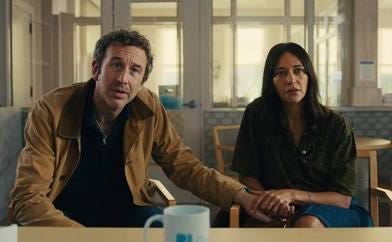When Life Becomes a Monthly Fee
A Review of “Common People” and a Personal Reckoning with Capitalist Healthcare
There’s a particular kind of horror that creeps in not through monsters or jump scares but through quiet plausibility. Episode 1 of Black Mirror’s seventh season, titled “Common People,” is precisely that kind of horror—a haunting, near-future narrative in which access to healthcare is reduced to a subscription model, complete with payment tiers, hidden costs, and the chilling phrase, “Pending approval.”
I watched this episode with a sense of déjà vu. Not because I’ve seen anything quite like it on screen before, but because I’ve lived some of it.
Years ago, I became a caregiver to my late wife, who was diagnosed with ALS—a relentless neurological disease that gradually stripped her of her independence, her voice, and eventually her breath. And like the desperate husband in “Common People,” I searched frantically for anything—anything—that could offer her hope. I sat in medical symposiums, read every white paper, made contact with clinical researchers in other countries, and even considered options as extreme and speculative as brain implants and experimental neural surgeries. None of them were covered by insurance. Most weren’t even discussed by doctors unless I brought them up. Everything—every possibility, every window of hope—came with a price tag and a disclaimer.
“Common People” takes this emotional terrain and maps it onto a world just one inch further into the abyss. Amanda, a schoolteacher, suffers a medical emergency and becomes the subject of a new, elite life-extension program. Her husband must subscribe—literally—to keep her alive. As he grapples with rising fees and ever more invasive upgrades, the story reveals its central thesis: in this society, care is not a right. It is a recurring charge.
Philosophically, the episode raises a fundamental question that I’ve wrestled with in both theory and practice: What is the moral meaning of life-saving care when it is structured as a commodity? If healthcare is purchased, tiered, and monetized like Spotify or Netflix, does it cease to be care at all? Or does it become something else—an industry of hope arbitraged by algorithms and gated behind wealth?
In the United States, we often talk about healthcare as if it's a service, like cable TV, but it isn’t. It’s the means by which we maintain the possibility of living fully, with dignity. And yet, this country has normalized a system where those without means are left to suffer—or die—because their illnesses are deemed economically unviable. “Common People” exaggerates this model just enough to show its immorality in stark relief, but make no mistake: the episode is a mirror, not a prophecy.
I can’t watch this without seeing the broader structure at work. Our healthcare system is not broken; it functions precisely as it was designed to function—maximizing profit, minimizing risk, and offloading responsibility from public institutions to individual families. What the episode does brilliantly is strip away the comforting language of “choice” and “coverage” and show us what this really is: triage by income.
I’ve been there. Not with neural implants, but with medication costs, denied claims, and specialist visits out of network. I’ve seen care delayed, therapy interrupted, and options disappear because a form wasn’t filed properly or a policy changed overnight.
And yet, we still call this “healthcare.”
What “Common People” reveals, more than any other Black Mirror episode to date, is that the most terrifying technology isn't what we invent—it’s what we normalize. The algorithm isn’t the villain. The system that uses the algorithm to gatekeep care is. And unlike the speculative fiction of earlier seasons, this story isn’t about the distant future. It’s about tomorrow morning. It’s about today.
I don’t know how many more people need to suffer, how many more families have to bankrupt themselves trying to keep a loved one alive, before we confront the truth: healthcare should never have been a capitalist venture. Life, love, memory—these are sacred. They are not monthly fees. They are not services. They are not subscription tiers.
And when a society loses sight of that, it doesn’t need a dystopian sci-fi show to warn it. It needs a mirror.
This episode held one up. And I saw myself in it.
P.S. My late wife was a school teacher.








